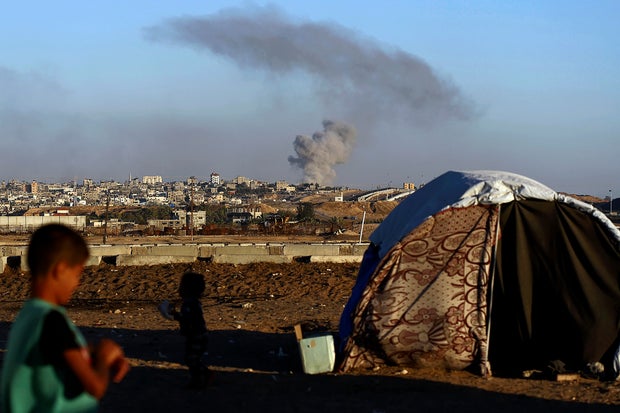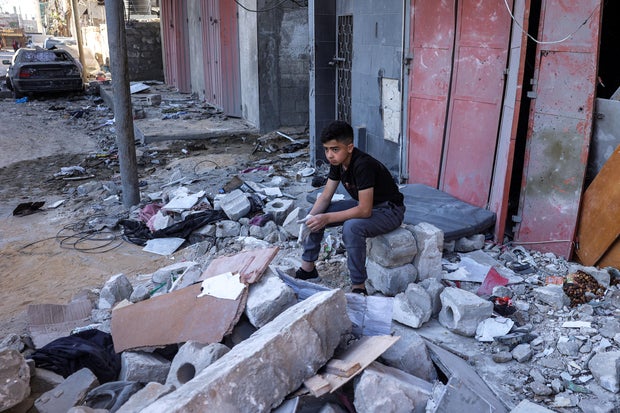Jerusalem — The Israeli military said Wednesday that it’s reopened the Kerem Shalom crossing into Gaza, a key terminal for the entry of humanitarian aid that was closed over the weekend after a Hamas rocket attack killed four Israeli soldiers nearby.
An Israeli tank brigade seized the nearby Rafah crossing between Gaza and Egypt early Tuesday, and it remained closed, but that limited incursion doesn’t appear to be the start of the full-scale invasion of the crowded southern city that Israel has repeatedly promised.
The looming operation threatens to widen a rift between Israel and its main backer, the United States, which says it’s concerned over the fate of around 1.3 million Palestinians crammed into Rafah, most of whom fled fighting elsewhere. Israel says Rafah is Hamas’ last stronghold and that a wider offensive there is needed to dismantle the group’s military and governing capabilities.
Ramez Habboub / AP
A senior Biden administration official confirmed to CBS News late Tuesday night that the U.S. paused one shipment of weapons to Israel last week over concerns of how such weapons might be used in a potential ground operation in Rafah.
The White House position has been that Israel “should not launch a major ground operation in Rafah,” the official said.
The halted shipment included 1,800 two-thousand-pound bombs, and 1,700 five-hundred-pound bombs, the official said.
The official said the White House was “especially focused” on the “end-use” of the 2,000-pound bombs and the “impact” those bombs could have in “dense urban settings.”
“We have not made a final determination on how to proceed with this shipment,” and other shipments are under review, the official disclosed.
The U.S. has historically provided Israel enormous amounts of military aid, which has only accelerated since the start of the war.
AFP via Getty Images
The U.S., Egypt and Qatar, meanwhile, are ramping up efforts to close the gaps in a possible agreement for at least a temporary cease-fire and the release of some of the scores of Israeli hostages still held by Hamas. Israel has linked the threatened Rafah operation to the fate of those negotiations.
Hamas said Monday it had approved of a cease-fire proposal presented by Egypt and Qatar, but Israel said what Hamas agreed to was “far from meeting Israel’s core demands.”
The Rafah crossing has been a vital conduit for humanitarian aid since the start of the war and is the only place where people can enter and exit. Israel now controls all of Gaza’s border crossings for the first time since it withdrew troops and settlers from the territory nearly two decades ago, though it has maintained a blockade with Egypt’s cooperation for most of that time.
Associated Press journalists heard sporadic explosions and gunfire in the area of the Rafah crossing overnight, including two large blasts early Wednesday. The Israeli military reported six launches from Rafah toward the Kerem Shalom crossing on Tuesday.
Gaza’s Hamas-run Health Ministry, meanwhile, said at least 46 patients and wounded people who’d been scheduled to leave Tuesday for medical treatment have been left stranded.
U.N. agencies and aid groups have ramped up humanitarian assistance in recent weeks as Israel has lifted some restrictions and opened an additional crossing in the north under pressure from the United States, its closest ally. But aid workers say the closure of Rafah, which is the only gateway for the entry of fuel for trucks and generators, could have severe repercussions.
The U.N. says northern Gaza is already in a state of “full-blown famine.”
The war began when Hamas militants breached Israel’s defenses on Oct. 7 and swept through nearby army bases and farming communities, killing some 1,200 people, mostly civilians, and abducting another 250. Hamas is still believed to be holding around 100 hostages and the remains of more than 30 others after most of the rest were released during a November cease-fire.
The war has killed over 34,700 Palestinians, according to Gaza health officials, and has driven some 80% of Gaza’s population of 2.3 million Palestinians from their homes. Israel’s military campaign has been one of the deadliest and most destructive in recent history, reducing large parts of Gaza to rubble.
President Biden has repeatedly warned Israeli Prime Minister Benjamin Netanyahu against launching an invasion of Rafah. But Netanyahu’s far-right coalition partners have threatened to bring down his government if he calls off an offensive or makes too many concessions in the cease-fire talks.




